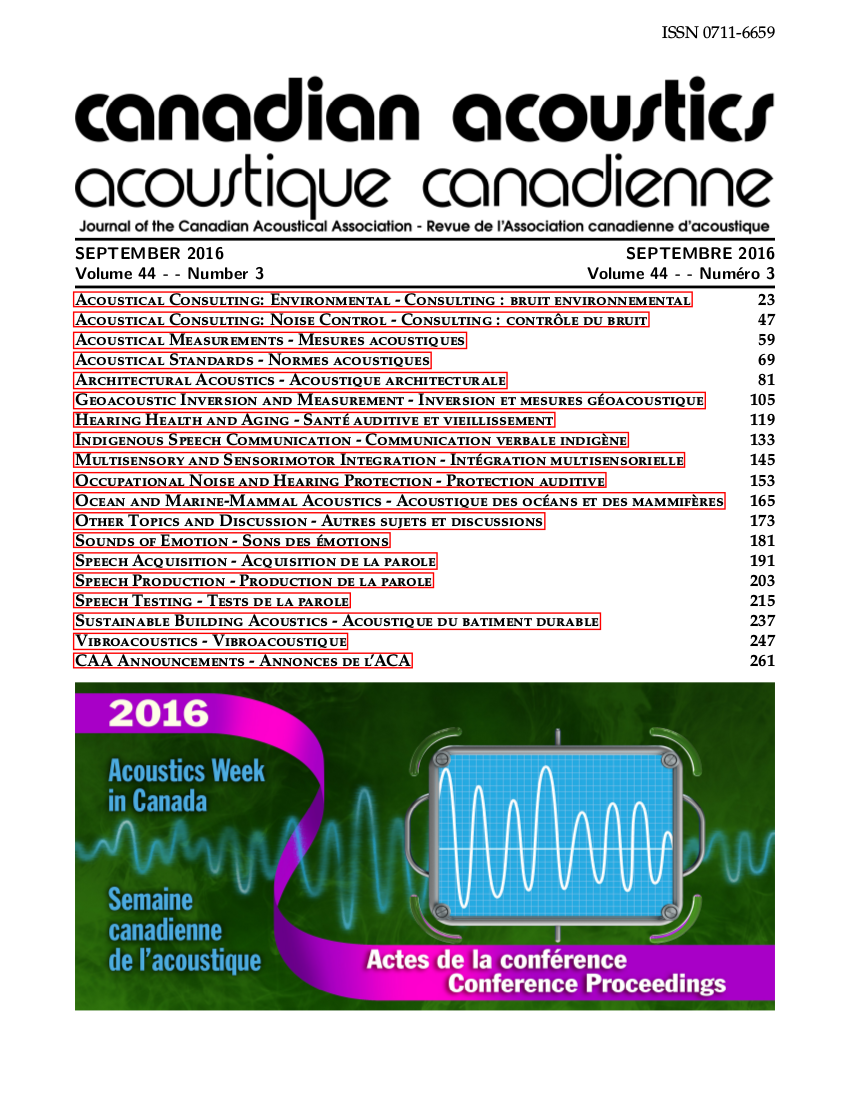Acoustic factors related to emotional responses to sound
Abstract
Sounds can have a profound impact on the way people think and feel about the world around them. However, recent work suggests that hearing loss alters the way people feel about sounds. Specifically, people with hearing loss are less affected by sounds than their peers with normal hearing. Moreover, increasing the overall level of sounds does not restore emotional responses. Instead, when the volume is increased, listeners with hearing loss rate all sounds, even the “pleasant” ones, as unpleasant. Because hearing aids increase the overall level of sounds, there is significant clinical and scientific interest in evaluating the potential effect of hearing aids on emotional responses to sounds, which was the purpose of this study. Adults with mild to moderately-severe sensorineural hearing loss listened to a subset of sounds from a published corpus of common, non-speech sounds. Participants rated the degree to which a sound made them feel pleasant/unpleasant and also excited /calm. Participants rated each sound at a moderate (60 dB SPL) and a high (80 dB SPL) intensity. In addition, participants rated moderate intensity stimuli while wearing bilateral hearing aids programmed with conventional processing and non-linear frequency compression. A control group of participants with normal hearing was tested in the unaided conditions. Participants made subjective ratings using a published visual analog scale and a computer keypad. Consistent with previous work, listeners with hearing loss exhibited a reduced range of emotional responses. Neither hearing aid technology improved the range of responses. However, for specific signals, there were positive effects of hearing aids, particularly non-linear frequency compression. Some of the specific effects of hearing aid signal processing can be explained based on the acoustics of the stimuli and of the hearing aid technologies. These acoustic relationships will be discussed, as well as implications for future technological developments.
Additional Files
Published
How to Cite
Issue
Section
License
Author Licensing Addendum
This Licensing Addendum ("Addendum") is entered into between the undersigned Author(s) and Canadian Acoustics journal published by the Canadian Acoustical Association (hereinafter referred to as the "Publisher"). The Author(s) and the Publisher agree as follows:
-
Retained Rights: The Author(s) retain(s) the following rights:
- The right to reproduce, distribute, and publicly display the Work on the Author's personal website or the website of the Author's institution.
- The right to use the Work in the Author's teaching activities and presentations.
- The right to include the Work in a compilation for the Author's personal use, not for sale.
-
Grant of License: The Author(s) grant(s) to the Publisher a worldwide exclusive license to publish, reproduce, distribute, and display the Work in Canadian Acoustics and any other formats and media deemed appropriate by the Publisher.
-
Attribution: The Publisher agrees to include proper attribution to the Author(s) in all publications and reproductions of the Work.
-
No Conflict: This Addendum is intended to be in harmony with, and not in conflict with, the terms and conditions of the original agreement entered into between the Author(s) and the Publisher.
-
Copyright Clause: Copyright on articles is held by the Author(s). The corresponding Author has the right to grant on behalf of all Authors and does grant on behalf of all Authors, a worldwide exclusive license to the Publisher and its licensees in perpetuity, in all forms, formats, and media (whether known now or created in the future), including but not limited to the rights to publish, reproduce, distribute, display, store, translate, create adaptations, reprints, include within collections, and create summaries, extracts, and/or abstracts of the Contribution.


